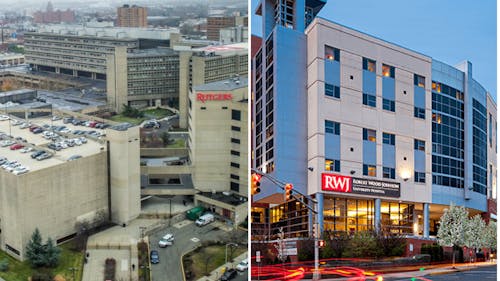Rutgers' Medical School merger met with backlash

The Rutgers Board of Governors' unanimous vote to merge New Jersey Medical School (NJMS) in Newark and Robert Wood Johnson Medical School (RWJMS) in New Brunswick has been met with backlash from students, faculty and the University Senate.
During a meeting on July 10, the Board of Governors discussed and approved of a resolution to merge the schools and the 2023-2024 fiscal year budget. Approximately 40 minutes of the virtual meeting was dedicated to public comment about the proposed merger.
The merger will transition Rutgers' two respectively accredited medical schools, NJMS and RWJMS, into a singly accredited institution with two regional locations.
During the meeting, several students, faculty and staff from the medical schools expressed their disdain for the merger, citing increased class sizes and a lack of reasonable answers to financial questions, possibly jeopardizing long-term accreditation and other concerns.
Laura Willett, a doctor and professor emerita of Medicine at RWJMS, said their questions during the meeting were generally disregarded.
"(At the meeting) you have 12 people, including various senior faculty, one student from each of the schools, some staff members, like a nurse from University Hospital (and) lots of different stakeholders, all of whom saying this is a potentially really bad idea for XYZ reason. And you don't even ask a question about it," Willett said.
Days before the meeting took place, the University Senate called for a delay of the vote merging the medical schools since the Senate did not approve administrative plans. The Senate is a considering body composed of faculty, students, administrators and alumni.
The Senate sent a letter to University President Jonathan Holloway, citing various policy violations if the vote proceeded without Senate endorsement. The Senate is now requesting Holloway release a public statement to pause the merger so the Senate can endorse any further plans, according to its latest resolution.
The idea of merging the two medical schools began in 2019 when the Future of Academic Medicine (FAM) Committee was established. The committee was composed of internal faculty dedicated to researching the possibility of a merger. Willett said the committee shot down the merger, and due to the pandemic shortly after, the plan fell through.
Similar to today, some faculty disapproved of the merger in 2020, as previously reported by The Daily Targum.
Willett, a member of the FAM Committee at the time, said the committee studied the proposed merger for about a year and found more detriments than benefits, including large class sizes and many unanswered questions about funding.
She said if the two schools merged, it would be one of the country's largest medical schools, making it more difficult for students to stand out when applying for residencies after medical school.
"The best schools in the country mostly have class sizes of about 150 to 200. As opposed to (Rutgers') 360 ... The more premier, both public and private schools, tend to have much lower class sizes," Willett said. "Because of that, it pulls us out of that group and would make us less attractive for highly qualified students from New Jersey. They might decide not to come to us because of that large class size."
She also described the long-term accreditation of the merged school as "an existential problem."
Willett said the Liaison Committee on Medical Education (LCME), the governing body for accreditation, only accredits schools that can provide "comparable" medical experiences to students, which she said would be difficult to provide with such a large class size.
While she did agree with the administration that the U.S. News and World Report ranking for the combined schools would increase, she said the increase would be marginal at best and did not see ranking increases as a valid reason to merge the schools.
In a 2020 report, the committee stated that a merger of the medical schools could increase the National Institute of Health’s ranking of the singular school and increase the funding for it.
Similarly, James Prister, a doctor and associate residency program director at RWJMS, said most students and faculty do not care about the ranking and view it as arbitrary. He noted that most medical students, residents and faculty focus on receiving or providing a good education.
"I have not met a single person that has come and spoken out in affirmation of (the merger). As far as our faculty and our students and residents are concerned, it's either a mix of people that have no idea that it's happening and people that think it's a bad idea," Prister said. "I haven't heard one positive thing from the merger from literally anybody that actually does the work."
During the July 10 board meeting, Catherine Mazzola, an instructor and pediatric neurosurgeon at NJMS, said that during her time at NJMS and University Hospital in Newark, she had witnessed a significant decay in medical services and contributions since Rutgers has taken partnership with the Newark facilities.
She said she works closely with residents and other faculty and has seen its already slim resources reallocated to other Barnabas Hospitals in New Jersey.
"We don't have the staff or support in terms of residence and (attending physicians) and nurses that we so desperately need in Newark," Mazzola said. "The merger of the medical schools will hurt and not help the people in Newark."
The University's statement to the Targum regarding the merger said its responsibility to Newark will remain "undiminished."
Prister said that in the face of all the backlash the administration received, he is surprised that the board unanimously voted on the resolution as if the decision was predetermined.
"It's amazing that my opinion or my colleagues' opinions on this are not solicited, and honestly, not important, (as if) it doesn't matter," he said.



